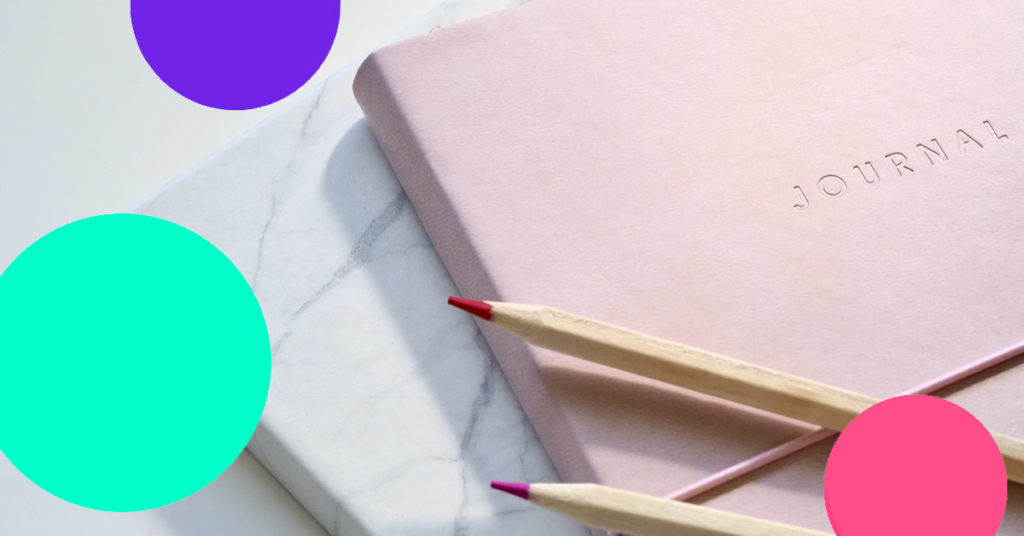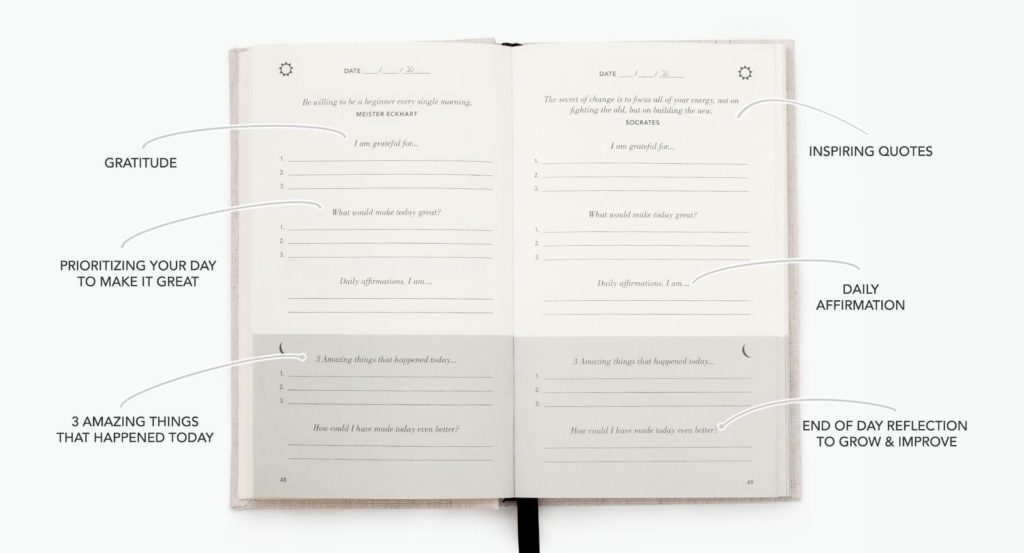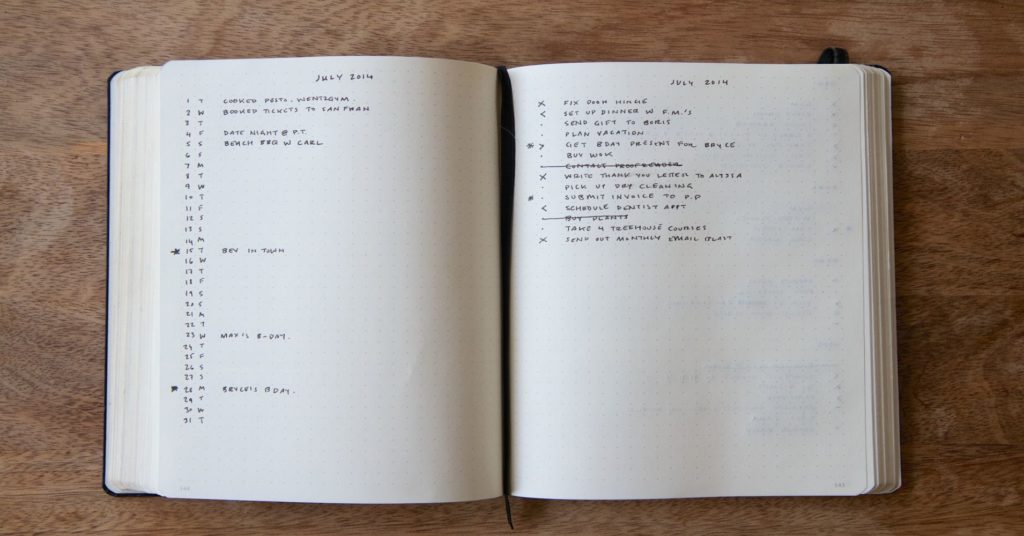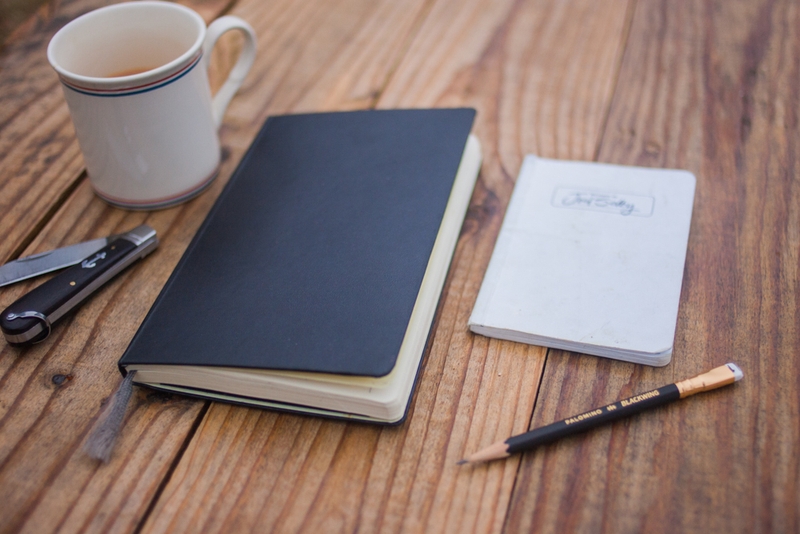A zen master’s guide to starting a journal – everything you need to know
The Five Minute Journal is one of the simplest ways that I have found to consistently ensure improving my well being and happiness. Both in terms of achievement and actual measurable, quantifiable results.
- Tim Ferris
I bet you’re reading this and thinking…
“Journaling? Why do I care about journaling?”
You might picture a teenage girl, laying on her bed with her feet waving in the air and writing about her crush in a pink diary .
That’s the association a lot of people have.
That journaling is for young people who are trying to discover themselves and deal with their emotions and hormones.
But that’s not at all what journaling is about.
Journaling is a powerful tool used by many of the world’s most productive people to process and improve their lives.
Effective journaling can help you
- Make better decisions during stressful periods in your venture or business.
- Improve your ability to empathize with your teammates and employees
- Improve your recall and memory
- Help you stay organized throughout your day
Whether you’re looking to stay sane and resolve all of the stressful events that are happening around you on a day by day basis…????????
Or if you’re just looking to improve your organizational system with a journal.
In this blog post I’m going to systemically go through everything you need to know to start journaling effectively. Starting from “Why?” to “How?”.
I’ll be talking about
- What is journaling and why should you be doing it? ✍️
- What are the scientifically proven health benefits of keeping a journal?????????
- What are the recommended supplies and methods you need? ????
- What do you need to know to get started with journaling today? ????
By the end of this post, you’ll be ready to 10x your productivity and mental state with a little help from a journal 🙂
So let’s dive right in…
Table of Contents
What is journaling and why should you do it?

Writers, inventors, and other creatives have been using journals as an integral part of their creative process for generations.
Creative innovators such as Leonardo Da Vinci, Tolstoy, Kafka all had journals as a major component within their productivity arsenals, and many of these journals ended up being published and are widely read even to this day.
Here’s what journaling means:
Journaling is the act of expressing your thoughts and mood by putting your life into words and then putting those words on paper.
It’s a mental ????and emotional exercise that helps you build strong emotional muscles to deal with life’s difficulties and uncertainties.
It’s a tool that helps you reflect, evaluate and process things that happen around you on a daily basis.
There’s been hundreds of studies done since the 60’s that tout the life-changing benefit that journaling keeps. Keep reading and see why there’s so much hubbub around this topic.
Skyrocket your productivity with the world’s smartest task management app
Request early access today, available free for a limited time
What are the scientifically proven benefits of journaling?

Scientific literature about journaling is constantly developing, every year there’s dozens of new articles that outline some of the purported benefits of journaling.
There’s lots of B.S – but there’s also lots of truth out there.
Here’s some of the scientifically backed findings on the benefits of journaling.
It helps your feel more in control of your life
![]()
A study run by Krista Fritson at the Department of Psychology at the University of Nebraska at Kearney came to a startling conclusion about the effect of journaling.
The study took 41 student participants ranging in age from 19 to 44 years old and split them into 2 groups.
1 group that would actively keep a journal and 1 that would not throughout an entire semester.
The study found that the students that had journaled throughout the semester had a statistically significantly higher evaluation of their own self-efficacy, basically – their ability to achieve goals.
And more importantly…
Students who journaled had an increased ability to achieve goals which persisted even after the semester was over.
Even limited journaling can lead to significant benefits to your self-confidence and ability to perform as a leader.
It helps you deal with stress and depression

A team of psychologists at the University of Iowa designed a study to measure the effect of journaling about emotions.
They came to a startling conclusion:
The effects of two journaling interventions, one focusing on emotional expression and the other on both cognitive processing and emotional expression, were compared during 1 month of journaling about a stressful or traumatic event. One hundred twenty-two students were randomly assigned to one of three writing conditions: (a) focusing on emotions related to a trauma or stressor, (b) focusing on cognitions and emotions related to a trauma or stressor, or (c) writing factually about media events. Writers focusing on cognitions and emotions developed greater awareness of the positive benefits of the stressful event than the other two groups.
So journaling about stressful events will help you process and re-evaluate those events and help you deal with the stressor the next time.
Not only that, but by lowering stress through journaling you’ll improve the quality of your sleep and lower your day-to-day anxiety.
In extreme cases, journaling has been found to improve your chances of surviving a heart-failure.
It helps you self-reflect and empathize

If you’ve ever wanted to dig deeper into yourself as a person – Journaling just might be the best way to do it.
Journaling provides a medium through which you can connect and develop through yourself.
Nursing students assigned with self-reflecting on a daily basis were able to improve their ability to gain perspective, develop their critical thinking skills and make stronger connections between their learning materials and day-to-day experience.
Daily self-reflection will help you better understand yourself and the people around you.
Journaling improves your memory

According to a study by Pam Mueller and Daniel Oppenheimer of Princeton University and UCLA Los Angeles, students who write out their notes by hand actually learn more than those that type their notes on laptops.
Mueller and Oppenheimer ran a series of tests where they compared student recall after they had taken notes with a laptop, and with a notebook.
They found that the students who had used a notebook had a stronger conceptual understanding of the subject matter than the laptop.
Oppenheimer and Mueller suggest that this is because handwritten notes involve more thought, re-framing, and re-organization, all of which promote better understanding.
They say that the highly manual act of handwriting requires more engagement with the subject matter, causing it to be stored more effectively in memory.
This means that you are more likely to remember the things that you write down in your journal
Now that we know some of the key scientific literature behind the benefits of journaling…
Read on ????and see how to get started with your own journal ????
How to get started with journaling
![]()
Want to give journaling a shot? Here’s how to jump into the world of journaling prepared.
Before you enter the world of journaling, you have to choose a journaling “framework” that works for you.
There’s a ton out there, each with their own philosophies and guiding sets of principles.
Read on and find your match.
The 5 minute journal

If you’re an avid Tim Ferris listener there’s a big chance you’ve heard of the 5 minute journal before…
He famously recommended this journal as one of his go-to morning routines.
The 5 minute journal is laid out to maximize the value you’ll get from a journal without forcing you to deal with organizing and structuring it yourself.
It’s perfect for lazy writers like myself ????.
People who use this journal report that they feel more focused and ultimately happier as a result of it.
The bullet journal

The bullet journal method bills itself as a “mindfulness practice disguised as a productivity system”.
It’s detailed, intricate and beautifully organized around a manual appropriately called Bujo.
Freestyle notebooks & apps

At the end of the day, the way you journal is up to you. If you don’t want to subscribe to a journaling system, freestyle journaling is the way to go.
Use physical journals
There’s hundreds of journals and notebooks perfect for journalling you can find online.
NYmag did a good write up on some of the most popular ones here.
Use journaling and diary apps
There are plenty of apps that promise privacy and security as well as a great writing environment.
Some of the most popular apps for keeping a journal are Penzu and Day One.
Start a blog
Blogging is another great way to get the benefits of journaling, regardless of whether you get started to make a name for yourself or just get your thoughts and feelings out in the open.
Keeping a blog opens the door to the widest possible audience, but it comes with the sacrifice of privacy.
Most people stick to using popular blogging platforms like Medium or WordPress.
Skyrocket your productivity with the world’s smartest task management app
Request early access today, available free for a limited time
And that just about wraps it up

In this post you’ve learned
- The scientifically proven benefits that keeping a journal can deliver to your life
- The most popular journals to boost your productivity and output
- The top apps for journaling
- And all the tools of the trade and top methods you’ll need in your writing????
BONUS: What to write in your journal
If you’re not sure what you should be writing about, or if you’re not feeling completely comfortable with your journal – I recommend starting with these prompts.
- What kind of day are you having, and why?
- What’s your favorite color, place, food, book, song, or movie, and why?
- What do you like to do? How does it make you feel?
- Where are you happiest? Describe that place.
- What’s something you’re good at? What makes you good at it?
- What do you consider to be your culture, and how do you feel about it?
- What would you change about yourself or your life? Is there a way for you to change it?
- What is your relationship like with various members of your family?
- If you have brothers or sisters, how are you similar to them or different from them? What about with your friends
- What are your views on religion?
- What keeps you up at night worrying? Are your worries realistic? Is there anything you can do about them?
- Do you have a philosophy of life? If so, what is it? If not, what is your method for making important decisions?
- In what areas are you optimistic, and in what areas are you pessimistic?
- What are your most prized possessions?
- Who is someone you miss?
- What is something someone else has that you envy? Describe it and your feelings about it
- What is a book, movie, song, or television program that has influenced you, and how?
- What is a mistake people often make about you?
- What’s something you disagree with about the way you were raised?
- What’s your favorite: season, color, place, or food? Describe it